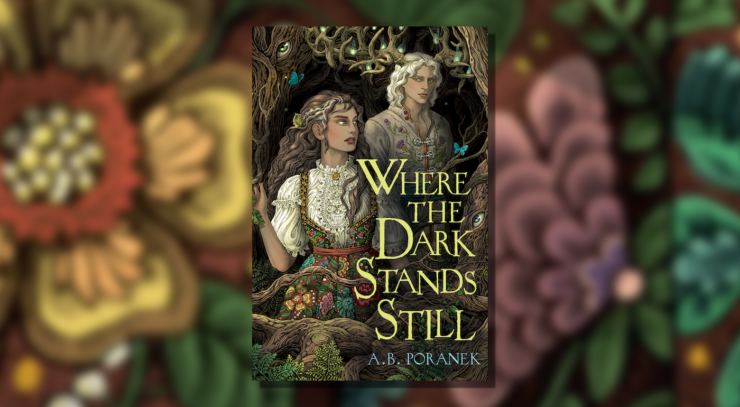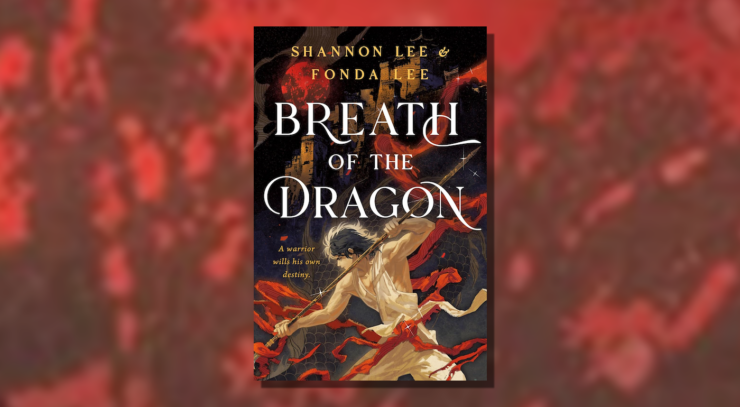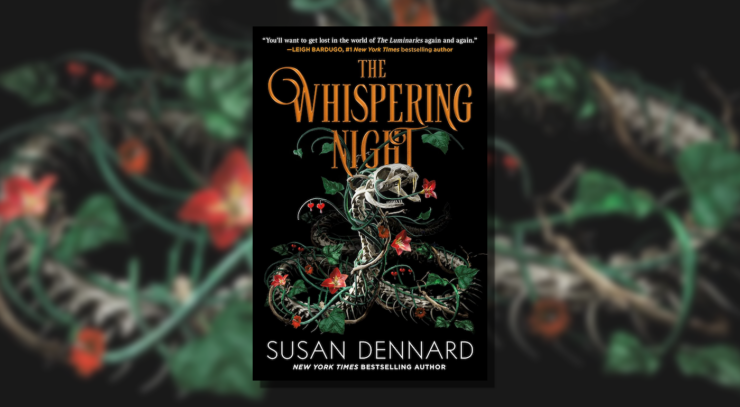Liska knows that magic is monstrous, and its practitioners are monsters.
We’re thrilled to share an excerpt from Where the Dark Stands Still by A.B. Poranek, a young adult fantasy novel out from Margaret K. McElderry Books on February 27.
Liska knows that magic is monstrous, and its practitioners are monsters. She has done everything possible to suppress her own magic, to disastrous consequences. Desperate to be free of it, Liska flees her small village and delves into the dangerous, demon-inhabited spirit-wood to steal a mythical fern flower. If she plucks it, she can use its one wish to banish her powers. Everyone who has sought the fern flower has fallen prey to unknown horrors, so when Liska is caught by the demon warden of the wood—called The Leszy—a bargain seems better than death: one year of servitude in exchange for the fern flower and its wish.
Whisked away to The Leszy’s crumbling manor, Liska soon makes an unsettling discovery: she is not the first person to strike this bargain, and all her predecessors have mysteriously vanished. If Liska wants to survive the year and return home, she must unravel her taciturn host’s spool of secrets and face the ghosts—figurative and literal—of his past. Because something wakes in the woods, something deadly and without mercy. It frightens even The Leszy… and cannot be defeated unless Liska embraces the monster she’s always feared becoming.
The festivities of Kupala Night are just beginning when Liska Radost leaves the village behind.
Her eyes prick with tears as she takes a final look over her shoulder. A gust of wind snags at her shawl, threatening to devour the flame of her lantern. This night, the solstice, should belong to revelry beneath a broad summer moon. It is the night unmarried girls weave crowns of wildflowers and float them down the river for the local boys to chase, the night that folk songs are sung to the roar of a joyful bonfire, the night when villagers pray to God for fertile fields and livestock and wives. But most importantly, it is the night that, according to legend, the fern flower will bloom.
And if the legends are true, this is the night that Liska will find it. She will take it into her hands and make her wish, and she will atone for her sins.
She treads deeper into the dark, through one of the many wheat fields that crawl along the rolling hills and wreathe the village from all sides. In midday, the sun will turn their stalks to spun gold, but now they are a foreboding rustle against Liska’s floral-patterned skirts, bowing like penitents in contrition. She raises her lantern higher, but its light is no more than a sputtering spark—a mockery of the Kupała bonfire that dances far in the distance, etching the thatched rooftops of Stodoła into the night’s canvas.
Stodoła. Home. A home she will not see again if she does not succeed tonight. She knows what rumors the villagers whisper: that she is a witch, that she is as wicked as the dark magic harbored in the spirit-wood. She almost smiles at the irony: that accursed place, called the Driada, is where the fern flower is said to bloom.
Buy the Book


Where the Dark Stands Still
It is her only chance at redemption.
Overhead, the moon rises, a great silver eye opened wide and watchful. It spurs Liska onward, stokes the flame of urgency in her chest. In all the stories, the fern flower only blooms until sunrise— there is not a moment to waste.
Her path takes her past the farmlands, to rolling hills dotted with phantom-white birch trees and coarse grass housing an orchestra of crickets. In an attempt to bolster her spirits, she starts to hum a folk song about a girl and two suitors and a rowan tree. The crickets set a rhythm, the breeze whispers in harmony, and slowly she convinces herself she is not afraid.
Until the spirit-wood comes into view.
She has seen the Driada before—every child of Stodoła has, brought here by the mischievous curiosity only a child possesses. How often did she stand in this spot with Marysieńka, the two daring each other to creep ever closer to the wood? Closer and closer and closer, until a growl or a rustle from within would send them shrieking, running all the way home. Children do foolish things until they are old enough to understand they are foolish—until their father teaches them to weave the straw hangings found in every Stodoła home, or their mother explains why she ties their hair with crimson ribbons. It is protection, she will say, gentle yet somber, from spirits and demons and the evils of the spirit-wood.
Standing so close, Liska must admit that the forest has a morbid sort of beauty: the beauty of flowers over tombs or the dive of a hawk catching prey. Its trees are enormous, thick as towers and sprawling, with branches like an old woman’s fingers caught in tendrils of cotton-thick mist. It smells, Liska realizes, like a freshly dug grave—loam and rot and carrion, staining every breath.
Somewhere in there is the fern flower. When she finds it, she must make her wish carefully, for it only grants one. In the legends, men often make poorly worded wishes and meet terrible ends, assuming they make it past the wood’s devilish spirits. Here at least, Liska’s curse gives her an advantage—she has always been able to sense spirits, hear them, even see them: the skrzat by the stove complaining of the dirty floor or the kikimora in the neighbor’s house exclaiming in delight as she finds yarn to tangle. But those are benevolent house spirits grown fat on offerings of bread and salt, friendly to the humans who shelter them. She doubts the Driada’s demons will speak the same tongue.
Is she really going to do this? It’s not too late to turn back.
She does not belong here.
A memory: Father Paweł sits in the kitchen of the cramped Radost hovel. He is a young priest, his fraying cassock as patchy as his beard, and his expression is too wary to pass for sympathy. He and Mama are the only people in Stodoła who know of Liska’s secret. At least, they were, until two evenings ago.
“The people are beginning to wonder, Dobrawa,” Paweł says. “There is no proof, but no one can explain it elsewise. The best thing you can do is to send her away, before she loses control again or the Prawotas rally enough people to their cause.”
Liska is not meant to hear his words, but she listens anyway, watching from outside the hut through a crack in the shutters. Her teeth are firmly clamped to her lip, and she tastes iron on her tongue. The day is humid, the sky a cloud-crowded blue, and a chicken is pawing at the dirt by her feet.
“I know, Father, I know, but where would she go?”
Dobrawa Radost—Mama—sits across from Father Paweł, picking mint leaves off a stem and laying them out for drying. With her rigid bearing and hoarfrost-cold eyes, she has always reminded Liska of Szklana Góra, the glass mountain from the stories that no knight could conquer. And like that mountain, she is neither kind nor cruel. She is simply indomitable, a trait required from her as Stodoła’s folk healer.
“She is of age,” Father Paweł replies. “And a well-behaved, proper girl. You could have her married off, apprenticed… or better yet, sent to a convent. God does not turn anyone away, and His presence will keep her from being tempted by those unholy powers.”
Dobrawa sighs. “I have considered all those things, Father, but is it truly a good idea to send her off alone? I fear what she may become without guidance.” She throws down a naked mint stem. “Ah, Bogdan would have known what to do with her. He was the only one who truly knew.”
“You are doing the right thing,” Father Paweł assures her. “It is not a condemnation, only a precaution. For her own safety, and…”
And for ours. Those last words go unspoken, but Liska knows what the priest wanted to say: that Liska is dangerous, that she has been corrupted by magic, like an orchard by blight.
“I will change that,” she promises the stars above. “I will make it right.”
She will do anything to prove that she is not dangerous, that she belongs—to the village and her people. Even if it means putting her faith in childhood fairy tales.
She steps forward, farther, closer, until she is looking up at the Driada’s trees. Dread clutches her throat, but she swallows it back.
“God preserve me,” she whispers.
Within the wood, something shrieks in response. The wind? No, it is too uneven.
A howl.
Or perhaps laughter.
Holding up her lantern, Liska Radost stares down the path she has chosen, no more than trampled underbrush between whispering nettles and cruel briars parted like jaws. In the flickering firelight, it all seems a mirage, the threshold to a palace of darkness. Waiting. Watching.
The laughter sounds once more, and this time she forces herself to smile back.
Then she steps between the trees.
Nothing is a certainty in the night in the wood.
In a windless dark shuttered from the world, a tree is not a tree but a disfigured body with crooked limbs; its bark not bark but a grotesque face with cracking skin; the brambles beneath not brambles at all, but wicked talons snatching and tearing at clothes. Nettles sting Liska’s exposed ankles, but the pain is nothing to the prickling at the back of her neck, the acute feeling that she is being watched.
Liska finds she is less afraid than she should be. Perhaps it is because this wood, just like her, is something unnatural, something other. By appearance alone, she fits more in the earthen weald than she ever did in the village—hair the color of freshly turned soil, skin olive and cheeks marked with freckles sucked out by the sun. For Kupała, she has worn festive strój: a crimson skirt patterned in pale flowers and an embroidered gorset over a lacy white blouse, her wild curls tamed into braids. Around her neck hangs a string of beads in rowanberry red, both a festive accessory and a ward against demons. When it catches on a branch and tears free with a snap, it feels like irony.
She does not stop to pick it up.
The forest deepens. Sourceless lights flash in the distance, too large to be fireflies. Something rustles in the thicket to Liska’s right; she could swear she sees a bowlegged thing lurking in the fog, but it crawls out of sight before her lantern’s light can seize it. The next time she steps forward, something crunches underfoot. A branch, she tells herself.
Even if it feels more like bone.
She keeps going. This is her only chance, and desperation far outweighs her fear. In her mind, she can already see it—returning home to Mama and telling her she has nothing more to worry about, that Liska’s magic will not trouble them again. No more pottery shattering without a touch, no more fires flaring in her presence, no more birds gathering at her window every morning, as if they want to tell her a secret she cannot understand.
What will life be like when she no longer has to keep her head down and pretend that the disasters trailing in her wake are mere coincidences? When she no longer has to rein in every emotion, lest it trigger her magic?
She had thought, really thought, that she’d finally had it under control.
Until Marysieńka.
The memory claws at her, but she pushes it back again. Look toward the light, she reminds herself. Then you will not see the shadow behind you.
But there is very little light in the night in the wood.
It is not long before Liska strays off the path. One distracted step, and when she turns around, she can no longer see the trampled trail—only trees ahead and trees behind, pressing ever closer, branches intertwining into a claustrophobic cage, and leaves slapping, cold and wet, against her face.
Her pulse thuds loudly in her ears. Paths like the one she just lost were carved by merchant caravans, passing from Orlica to the neighboring country of Litven. Those merchants enter the Driada prepared—they bring sturdy horses and rifles and swords, sometimes even hired guards. A week before their entry, they leave a tithe: meat or bread or coin at the mouth of the path they choose to follow, offerings for the demon Leszy.
Leszy. A name known to every Stodoła villager, memorized like a prayer yet spoken like a curse. It is he who rules the Driada and keeps the spirits contained, he who protects the travelers in the wood and the villages around it. It is he who does not permit anyone to enter into his domain without paying the tithe—and all know that if the Leszy is not satisfied with what he receives, those who enter the Driada will not return.
Liska made her own offering the night before Kupała—a loaf of rye bread and dried kiełbasa, left at the opening of the path she intended to follow. Now that she has strayed, she has lost any hope of the Leszy’s protection. Just as the stories tell of the Leszy guarding travelers, they also warn that those who stray from his paths will never find their way back to them again.
“It doesn’t matter,” Liska says to the wood, or to God, or perhaps in that moment they are one and the same. “I don’t imagine you would hide the flower where it could be easily found.”
That is when her toe strikes a root. She pitches forward gracelessly, crashing to her knees. The lantern slips out of her fingers, glass shattering with a muted crack.
The flame goes out.
Excerpted from Where the Dark Stands Still, copyright © 2024 by A.B. Poranek.














